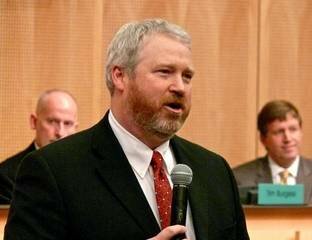Several months ago, writes the Seattle Chamber's Christine Donegan, Seattle employers issued a joint appeal to Mayor McGinn and City Council to avoid raising taxes to balance the 2010 and 2011 budgets. As a follow up, twenty-two business organizations have issued a letter to the mayor and council with specific suggestions for balancing the budget without negatively impacting employers or essential city services.
 Mayor Mike McGinn, introducing The Maldives at Bumbershoot
Mayor Mike McGinn, introducing The Maldives at Bumbershoot
Dear Mayor McGinn,
In April, over two dozen representatives of Seattle employers wrote to urge you to refrain from increasing existing taxes and proposing new taxes to balance the City’s 2010 and 2011 budgets. We believe that burdening employers with additional taxes will slow economic recovery in Seattle. As a follow up to that letter, we write to offer specific suggestions for balancing the City’s 2011 budget that will preserve jobs and critical City services.
As you are well aware, the City of Seattle faces a projected $67 million shortfall between planned expenditures and anticipated revenues in 2011, with $11 million less in revenues than previously predicted. However, the City is projected to collect more General Fund revenue in 2010 than was collected in 2009 and this trend is anticipated to continue through 2012.
Between the year 2001 and 2011, General Fund revenues will have grown by 45 percent, 18 percent when adjusting for inflation. The City’s budget shortfall is not driven by decreasing revenues, but rather as a result of expenses that are increasing at a rate greater than revenues and a rate greater than Seattle’s Consumer Price Index (CPI)....
 Part of the Library's budget now goes to keep all its windows shiny.
Part of the Library's budget now goes to keep all its windows shiny.
In desperate times, the first move is outsource economic responsibility onto a specific, but not-too-vocal "sinning" population. State facing a multi-billion-dollar deficit? Soda-drinkers, gum-chewers, you're up. Library facing cutbacks? Late-returners, whip out the checkbook.
But with desperation driving the change, these responses are not necessarily fair or effective. It's one thing to recoup formerly externalized costs, and in so doing plug a leaky budget. It's another to try to reach into people's wallets for what's handy. Especially when it comes to publicly funded services, like libraries.
On Monday, the Seattle Public Library sent out a news release saying they were "considering" raising fines for overdue materials "to encourage their timely return for use by others and to help offset budget reductions."
But the rest of the release is short on the timely return strategy, and long on how the extra income would help the Library make up for the $3 million in budget cuts they are implementing this year. By "short," I mean there is no evidence provided at all of the scope of late returns, or an estimation of the impact of a $0.10 increase, to $0.25 per day for books, from $0.15. (Fees range depending upon the item borrowed.)...
The City of Seattle's general fund is a portrait of neediness. It's carrying about $4 million in red ink from 2009, and is looking at a $7-million shortfall in 2010, thanks to revenues coming in $2 million under projections and $5 million in "expenditure risks" (more on this later). In addition, 2011's forecast keeps coming in $56 million short.
This morning, the Mayor's budget director, Beth Goldberg, briefed the City Council on the steps necessary to balance the budget, with "the bulk coming from police, parks and libraries," sums up the Seattlepi.com. The cuts total $12.4 million (pdf), and an unspecified amount would carry over into 2011, to address that year's looming deficit.
Last week, Mayor McGinn was also looking at the Fire Department for cost savings; after this weekend's fire, which took five lives, cuts are on hold. An investigation into the equipment failure that left the first truck to arrive unable to pump water is ongoing.
Says McGinn: "The tragedy in Fremont this past weekend gave us a concrete example of the importance of protecting our public safety budget; in light of that event, I am not proposing any reductions to the Fire Department, giving us an opportunity to fully review the safety implications of any potential reductions."
That still leaves police (a $2.27 million cut), human services ($246,000), and parks ($1.67 million). The police department will have to do without 21 extra officers promised by the Neighborhood Policing Plan, and the city is "cutting" 53 full-time positions (not hiring for 44 vacancies). McGinn notes that the city is still staffing police officers at record levels.
(More peace officers doesn't necessarily bring more peace and quiet: A man who fired a shot in Belltown last weekend was released after police questioning found he had a permit to carry the weapon. The man claimed he'd fired it to frighten off two other men who'd flashed their guns at him. All in favor of taking advantage of this return to frontier justice and renaming Belltown "Tombstone," say aye.)...
Aw...how can you stay mad at that view?
KING 5 isn't just "Get Jesse." They also go after big spenders on the government dime. A recent investigation called "Waste on the Water" (fire in the sky...whoops, that slipped out) found millions of dollars worth of missing cost-control oversight.
WSDOT, the no-cost-overruns people, have run Washington State Ferries for over half a century. In that time, they have regularly caught the public eye for wasting money. WSDOT Secretary Paula Hammond told KING 5 that she didn't know chief engineers were earning triple overtime for assigning themselves work during scheduled vacations, and earning up to $140 per hour. One engineer more than doubled his salary with overtime pay.
Google hits for "washington state ferries" and "reform"
What's the solution? KING says Secretary Hammond and possibly-still-Governor Gregoire are going to create a new staff position, a deputy ferries director. There'll be a "red flag" report, and an "expert panel," too. As you know, when it comes to changing an entrenched culture (Hammond's words), there's nothing like more managers, reports, and expert panels to turn things around. ...
Volunteer Park Conservatory: waiting for the budget axe?
This morning the news is about the resignation of Seattle Parks superintendent Tim Gallagher, who had been getting raked over the new-frugality coals recently for, during March and April, visiting Washington, D.C., Atlanta, Palm Springs, and Australia. Gallagher was last heard from flip-flopping on naming Perugia Park and instituting a smoking ban in parks.
His resignation letter, though, focuses mainly on the hard truth that we aren't funding the operation and maintenance of our park system, even as we stuff our pockets with more pocket parks. CHS has previously sounded the alarm on budget cuts possibly closing the Volunteer Park Conservatory. (Hey, this isn't about us, Gallagher! It's about scapegoating. And that's you. You're the scapegoat.)
Recent city departures also include Bill Rumpf, interim housing director; Mark McDermott, city personnel director; and Phil Fujii, deputy mayor. That's from March and April--at the end of December, SDOT director Grace "What snowstorm?" Crunican jumped ship, in January, Office of Sustainability director Michael Mann hit the public-private bricks, and in February, advisor Chris "the PhD stands for Piled Higher and Deeper" Bushnell was pushed out and finance director Dwight Dively decided he preferred King County's leaky budgetary boat. (Someone needs to update the "Meet the Team" page.)
Healthy transition turnover? Or people getting out while the getting's good? Seattlepi.com has the story on the city's mounting projected budget deficits: $11.7 million this year, and in excess of $50 million in 2011 and 2012.
A joyful "Gum Wall" courtesy of SunBreak Flickr pool member lwestcoat
Governor Gregoire has come up with a few ways to raise an easy $605 million: sin taxes. The Olympian says she'd put "new levies on toxic materials that include refined oil, and on bottled-water, carbonated beverages, cigarettes, candy, and gum."
I suppose the tax on toxics like oil qualifies as a sin tax. (We're getting very moral about the environment these days.) In any event, it brings in the most money, about $215 million, mostly from Washington refineries. Putting a sales tax on candy and gum, the Seattle Times says, brings in just $28 million.
You'd think $600 million added up to real money, but the state has a $2.8 billion deficit forecast for 2010 and 2011. Gov. Gregoire is hoping to talk the federal government out of over $400 million, but that still leaves quite a shortfall.
Visiting family in Portland over the weekend, I got to witness firsthand the difference between how Oregon and Washington are handling their budget crises in the midst of a recession. On Tuesday, Jan. 26, Oregon voters look set to approve ballot Measures 66 and 67, reasonable tax increases on wealthy individuals and businesses, to help fund their budget shortfall and support crucial public services.
Measure 66 raises the state income tax (Oregon has an income tax but no sales tax) 1.8 percent on individuals making over $125,000, and households making over $250,000. The measure also lowers taxes on the unemployed by exempting the first $2,400 of unemployment benefits. Measure 67 raises the minimum business tax for the first time since 1931, from $10 to $150, and adds a 1.3 percent tax on corporate profits over $250,000. The measures are public referendums on bills passed by the legislature last year, and pollsters show both passing....
As the PSBJ reports, Ryanair has walked away from an order of 200 Boeing 737s, an order that would have more than doubled the size of the Irish budget airline's fleet. It's not exactly a crushing blow for Boeing, since "The airline added Friday that its decision won’t affect its delivery of 112 737s in the next three years."
Seattlepi.com quotes Ryanair CEO Michael O'Leary as saying, "We have no plans to reopen discussions with Boeing or any other aircraft manufacturers," which lends credence to the view that Ryanair is rethinking its breathless rate of expansion. That is the subtext in Bloomberg's story on the jet deal, which would have been worth around $14 billion, according to the Financial Times.
Bloomberg quotes analysts who point out that with over 100 737s on the way, Ryanair is in no pressing hurry to make a deal if it thinks the market for planes might dip further during the recession. In fact, Boeing and Ryanair had agreed on the price, but Ryanair was demanding unnamed "contractual terms and conditions" that Boeing balked at adding.
O'Leary had one card left to play this hand--How much was it worth to Boeing not to "lose" one of the largest deals in commercial airplane history? Not enough. They'll shuffle the cards and start over.
What do we want? Bus and library hours! When do we want 'em? Over the next biennium!
Bus service hours for the next two years won't be cut, says the King County Council. Instead, fares will go up $0.25 each year, to $2.00/$2.25 (off-peak/peak one-zone fare) in 2010 and $2.25/$2.50 in 2011.
That, combined with full bus-wrap ads (with an open strip for windows), more efficient bus routes and scheduling, and diverted funding from the King County Ferry District, will save the 310,000-odd hours that had been on the table.
Those are generic bus hours, of course--Metro is not making any promises about your particular bus route not changing. In fact, the budget crunch (Metro had been looking at a $213 million deficit for the next two years under the proposed budget) gives Metro license to use software to optimize its routes and schedules more aggressively--something I believe they have wanted to do for some time, but have held off on due to the "You moved my cheese!" response of riders outraged at things changing.
Seattle Transit Blog notes that, in other transit news, the federal government is considering letting the FTA take over safety regulation of "commuter rail, subway, and light rail systems nationwide," citing "increased collision rates, derailment rates, and worker fatalities." Federal oversight would eventually extend to bus transit systems, too. Depending on the administration, this could be either good news--federal money for safety--or bad news, if safety regulations are tightened to make transit costs prohibitive.
Wind storms mostly missed Seattle, but were still felt.
It's almost Thanksgiving, and there's a heartening amount of goodwill out there. After thieves stole about $2,000 worth of food from the Rainier Valley food bank, the food bank has almost disappeared under a flood of food and cash donations. The Seattle Times reports about $100,000 in donations have arrived so far.
If you're planning on traveling for the holidays, you'd better have booked your seats already. Seattle Transit Blog has the Amtrak update: even with extra service, Seattle-to-PDX trains are almost sold out. If you're flying, you might notice a new "holiday surcharge" on your fare. Here's a holiday travel checklist, courtesy of the Times.
A coyote has been wandering around Terminal 91, possibly hoping to take in the sights on an Alaskan cruise. (Holland America doesn't advertise with us--...yet--but who doesn't want to win a cruise?) Magnolia gets all the cool sightings. Cougars, coyotes, now orcas. West Seattle is still thrilled with the seasonal return of their brant geese.
Local homebuilder Quadrant Homes is being sued for "widespread, shoddy construction," reports Seattlepi.com. On the other hand, winemaker Columbia Crest's 2005 Reserve Cabernet Sauvignon was voted the best wine in the world by Wine Spectator magazine. That's all well and good, but for everyday drinking (not that you should drink every day), cognoscenti have been crowing about Columbia Crest's Two Vines label. I have been trying this out, and am on board.
On The SunBreak, I dug into the city council's proposed budget (after I started wondering how they were paying for those restored library hours) and state's now-chronic budget deficit, with the findings only increasing my sense of unease. Seth watched basketball at KeyArena. Audrey watched people cook and sew on TV. And Jeremy profiled Manifold Motion and the Satori Group, but not in a potential-terrorist way.
As the AP reported yesterday, the state is predicting "weak revenue" for the next year and a half (weak to the tune of $760 million), and so the deficit for that time period has grown to $2.6 billion. That said, Publicola is using $11.6 billion--the cumulative deficit amount for the state's budget from 2009 through 2011 so far--as a way of reminding everyone of how far we are from where budget forecasts started. (It's the same story as at the county and city budget level, writ large.)
With the series of cuts necessary to retire last year's $9-billion deficit, the state sliced past fat and into the meat of its social services. Much of the budget is mandatory, "protected" funding, so the legislature can only cut about one-third of the $33-billion biennial budget total. To make up the new $2.6 billion, Washington Budget & Policy Center says, the state would need to cut that one-third by about one-third.
With unemployment across the state at 9.3 percent (it's actually higher in Seattle), and projected to rise, not many people will greet the idea of higher taxes with delight. "The economic downturn has forced more than 60 percent of Puget Sound area residents to delay their retirement plans," says the PSBJ. If slumping consumer spending is driving most of the state's deficit, look for that to continue.
But taxes are what Democratic leadership is suggesting, though since they are looking for options that include their reelection, one likely suspect is sin taxes. Actually, higher liquor taxes prices just went into effect last August, when the Liquor Control Board raised its markup to just over 50 percent.
What we have here is both a failure of leadership and imagination. State and local government spending is hugely important to the economy--one study says that one lost government dollar equates to $1.41 in lost economic activity. Simply put, slashing government spending makes a recession worse, at precisely the time when people need government programs most.
Yet closing "tax loopholes" and soaking the remnants of our middle class isn't going to get the job done, either. I am a long way from knowing what the solution to this particular dilemma might be, but one thing is clear: The current plan--implementing destabilizing cuts in the hopes that the economy is "just taking a break" and will be back soon--is the option of people who have government jobs. And if things worsen, plenty of people now in Olympia may not have them.
The Seattle City Council is working on its 2010 proposed budget, which differs from the "endorsed" budget in that this time they're serious. (The city uses a modified biennial budget process, producing an endorsed budget for two years that sets spending levels, but does not appropriate money, for the second year. The proposed budget takes care of that.)
The Council's 2010 budget is weighing in so far at $3.88 billion, and is supposed to address a $72-million shortfall between the endorsed budget's predictions of revenue and what has actually transpired.
For instance, Seattle City Light's surplus electricity sales were predicted to be about $142 million for 2009, but now it's estimated at almost half that: $77 million. The Department of Planning and Development (DPD) was supposed to bring in $28 million from construction permits and licensing and so forth, but with construction and real estate markets in a coma, the new number is $14 million for 2009.
B&O tax revenue "growth" declined severely in 2009--I'm quoting the city budget there, but my loyalty to English demands that I mention there was zero growth--and in fact revenue is projected to dip about 7.4 percent, to $162 million.
So the budget cutting is general, though the Council has dialed back some of Mayor Nickels' cuts, and added back in some library funding. In this environment, it's odd to see that they have also repealed the employee hours (aka "head") tax, delighting the bean counters at the Seattle Times, but resulting in a loss of $4.5 million for the city. The tax levied was not more than $25 per full-time employee per year, and there were deductions if the employee(s) didn't commute by driving. Businesses grossing under $80,000 were exempt.
Political theater aside--the contretemps over whether City Council members would "chip in" to reduce a $72 million shortfall forced me to exhale slowly with my eyes closed--the reality is that the city's tax base has shrunk to what it was in 1987. It is a substantial shock, and with a jobless "recovery" on the horizon, the Council's Richard McIver is probably right in expecting a worse 2011. And while the City Council is busy getting lean and mean, simple budget starvation tends to yield the same results.
Mayor McGinn, your hot seat is ready.
"Public Library 1" courtesy of The SunBreak Flickr pool member Jeff Blucher
There was muted celebration at the Friends of the Seattle Public Library blog last week, after the Seattle City Council voted to add back $863,000 to the library's funding. Besides keeping library doors open longer, the money will allow the library to reinstate 27 staff positions that had been cut.
Besides the Seattle Central Public Library, the open-seven-days-a-week branches will be Ballard, Beacon Hill, Broadview, Capitol Hill, Douglass-Truth, Greenwood, Lake City, Northeast, Rainier Beach, Southwest, and West Seattle.
Columbia, Delridge, Fremont, Green Lake, High Point, International District/Chinatown, Madrona-Sally Goldmark, Magnolia, Montlake, NewHolly, Northgate, Queen Anne, South Park, University, and Wallingford branches will be open only five days per week, with only one weekend day: Saturday, 10 a.m. to 6 p.m.
The Seattle Times reports that while $863,000 sounds like a lot, the library is still facing an operating budget cut of $1.77 million for 2010. Mayor Nickels' budget called for a $2.6-million budget reduction. At this point, the library is planning another week-long furlough for next year as well.
To make matters worse, that doesn't include a 37 percent gouging of the library's 2010 capital budget, down to about $1 million from $1.6 million this year. The capital budget pays for major maintenance of the library buildings, so losing almost 40 percent will result in a visible difference in library standards.
 It's fall and web-spinners are out, spinning webs for 3GS iPhone auteurs or just hanging out making you nervous.
It's fall and web-spinners are out, spinning webs for 3GS iPhone auteurs or just hanging out making you nervous.
Seattle Bubble tipped us off to this CHS story about Seattle's condo auctions this weekend, and KUOW's "condo glut" take. Short story: the auctions are likely to reset condo values lower citywide. Seattle Bubble thinks that a valuation reset is about time.
Mayor Nickels released his budget for 2010, which slashes city staff and raids our rainy day fund. It also raises $600 million for the deep-bore tunnel construction project. The city council sounds ready to rubber-stamp it--except for Nick Licata.
On the SunBreak, Roger reported on a class action lawsuit proceeding against the Oklahoma Thunder née Seattle Sonics ownership group. Jeremy looked into the Twilight future of Forks, and MvB talked with Metro chief Kevin Desmond about technology and transit.
Next week, Publicola is looking forward to The Pink Panther at Central Cinema. Count us in. More than ever, the world needs Peter Sellers' Inspector Clouseau.
Most Viewed Stories
- Flash! A Mob Takes Qwest Field at Half-Time
- Opinion: An Atheist's Defense of "Everybody Draw Mohammed Day"
- Why Will Smith, Joe Montana, and Wayne Gretzky Are All Coming to Issaquah Tonight
- Gather 'Round, Children, and Hear the Story of Courtney Love's Bumbershoot Secret Show
- Film Forum Spotlights Leonard Cohen, Small-Town Ohio
Top Rated Stories
- Stars, Ice, and Impossible Beauty: Backpacking in the North Cascades [Photo Gallery]
- PAX Prime 2010: Nerds In The Mist
- Allez au Cinema! Avec "The French Project"
- Wheedle's Groove's Soul Men, Interviewed at Bumbershoot 2010 [Photo Gallery]
- (Don't) Save it for Later: The English Beat's Dave Wakeling, Interviewed



Most Recent Comments